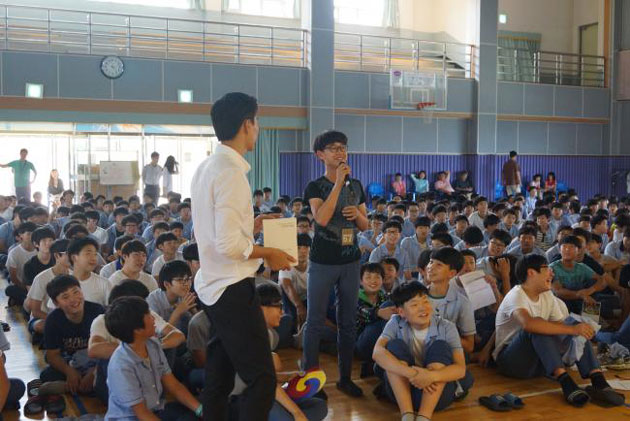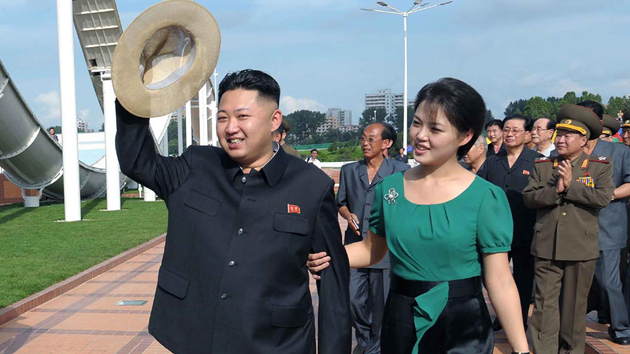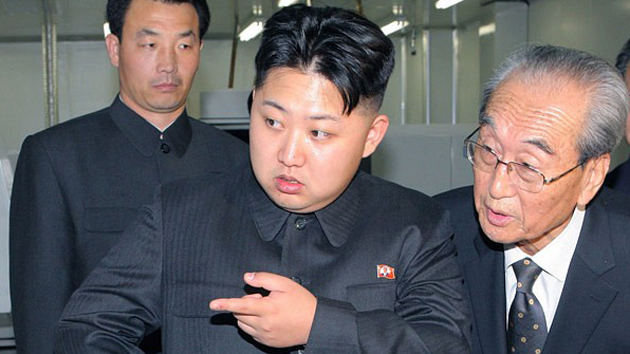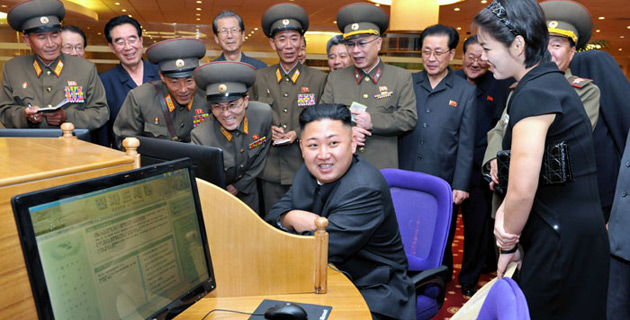
Students in South Korea ask a North Korean defector questions during "unification education."North Korea Strategy Center
Jae stands nervously in front of the crowd of South Korean high schoolers. “Do North Korean students often date each other?” one student wants to know. Jae, a tall 23-year-old North Korean defector, grins. They do, he says, but secretly. Because students are reprimanded for showing affection, he explains, “if you like someone you often say, ‘Let’s become friends,’ which is basically the same thing as ‘Will you go out with me?'”
The questions keep coming: How long is military service in North Korea? Do schools provide students with lunch? Do you want to go back?
Jae, one of dozens of defectors who speak at South Korean schools for government-sponsored “unification education” sessions, responds to the last question diplomatically. He wants to visit his extended family, but he probably wouldn’t want to live in North Korea again “because of the bad memories.”

Jae grew up in a North Korean town that bordered the DMZ separating the countries; once in a while, thick balloons from South Korea would drift through the sky and land on the ground. They were filled by human rights activists in the south with USB drives and pamphlets condemning the dictatorial regime in Pyongyang. The police would snatch them up as soon as they reached the ground. But when Jae went into the mountains, away from people, he would see dozens of balloons snagged in bushes and trees. After his father died and the government stopped giving his family enough money for food, Jae decided that if there was one thing he wanted the world to know about North Korea, it was that even though the country emerged from the famine of the late 1990s, many people still starve today.
He fled five years ago. Now a junior in college in Seoul studying international relations—he raved to me about Harvard’s online course “Justice”—Jae lives less than 100 miles from his hometown. He has found that many South Koreans remain fascinated by the prospect of meeting a defector from the north, but have no clue that 25,000 of them now live in their country.
I began meeting North Korean refugees in 2012 when I lived for a year in Gwangju, a midsize city in the southern region of South Korea. Once a week, I mentored and taught English to defectors at a refugee reintegration center. When I tell this to people, they’re eager to hear about what the defectors are like, and I tell them that the two middle school girls I worked with were just like most other middle school girls I know—sometimes giggly, sometimes moody and tired of school. Over the course of the year, we made our way through present and past tenses, saw World War Z, went bowling, took walks around the reservoir near our apartments, and celebrated birthdays. I introduced them to chocolate cake, and they introduced me to a spicy bean sprout dish.
One of the few moments when the subject of North Korea came up was when one student walked into the classroom, beaming, and told me in an excited jumble of Korean and English that earlier that week, her brother and grandmother had arrived in South Korea. Sure I had misunderstood, I drew a rough picture of the two Koreas on a piece of paper, and then two stick figures with arrows going in a half moon, from North Korea to Seoul. (It’s virtually impossible to cross the heavily mined DMZ, so almost all defectors travel through China and southeast Asia before flying to Seoul.) She nodded excitedly. Two weeks later, we had a new member of our class: a 10-year-old, wearing a red plaid shirt and jeans, who smiled shyly as another English teacher wrote out the letters of the alphabet and sounded out, “C-A-T.”
Only a few dozen defectors have agreed to talk with or be photographed by the press. Many feel it’s not worth their time. Some fear that their families back home could be punished for their escape (the names of all defectors in this article have been changed). But during my time working as a teacher and journalist in South Korea, I got to know a range of defectors: Some were middle school students whom I tutored, and others, like Jae, were adults I reached out to, hoping to learn more about life in in a notoriously sealed-off corner of the world.

Sometimes, their stories of survival matched the bleak, harrowing depictions of North Korea that we typically see in the news. Jae became so hungry as a child that he had taken to eating tree bark. A middle-aged woman who now works at a defector-run radio station in Seoul told me that when she arrived in South Korea, she assumed that the heaps of rice and hard-boiled eggs that greeted her at the defector integration center were some sort of propagandistic joke. In North Korea, she said, a hard-boiled egg traditionally was given to a person dying of hunger: Either the nutrients would help them survive, or it was a satisfying last meal. Human rights violations in North Korea have been painstakingly documented by the Database Center for North Korean Human Rights, which surveys defectors about the abuses they witnessed in the north. The first question reads, “Did you witness executions in North Korea?” It is followed by a table with columns headers including, “Name of victim,” “Age of victim,” “Date of execution.” Another question asks, “Are you aware of biological experimentation on live humans in North Korea?” A chalkboard in the center’s office tallies up abuses that nearly 15,000 defectors have reported; in June of this year, the number read “50,528.”
Yet, many also make clear that they don’t simply see their prior lives as hell on earth—they describe a more complex relationship to a country that some of them still call “home.” On a humid afternoon in June of last year, thirty college students, all defectors living in Seoul, sat in a classroom amid water bottles and backpacks, working on personal narratives. They were participants in a writing program run by the North Korea Strategy Center, a nonprofit that aims to increase awareness about them and what their experience is like.
One student wrote: “In North Korea, since we were out in the fields farming and actively interacting with one another, it was easier to become friends with my peers. In South Korea, friends interacted with each other by talking about celebrities, playing games, or singing karaoke. Friends didn’t feel like friends.”
“In North Korea, people tend to sleep early due to electricity shortages,” wrote another. “In the evening, the whole town turns into a jet-black night without a single light. You feel like a blind person.”
Another student wrote about his first time on Seoul’s gleaming subway: “I didn’t know where to direct my eyes! There were girls in hot shorts seemingly no different than panties. My cheeks flushed red and my eyes lost focus.”
Another stated, “I’m pretty sure there aren’t any refugees who defected because they don’t love their homeland. North Korea’s government left most of them with no other choice.”
Ga Eul, a peppy, English-speaking 23-year-old with dyed brown hair and purple glasses, began her essay this way: “I was born in January of 1991. Until 2005, my education consisted of learning how to worship Kim Il-Sung and Kim Jung-Il.”
As a middle-schooler, Ga Eul dreamed of becoming a math teacher. “I studied [math] more than anyone else because I enjoyed it so much,” she wrote. Ga Eul came from an upper-middle-class family—her father managed a clothing factory and her mother was a farmer—and her parents scrounged up the money to pay for a private tutor. But when Ga Eul’s extended relatives were caught trying to escape from North Korea, she wrote, “My dream of becoming a math teacher was not possible anymore. My family members were branded enemies of the state.” Ga Eul was told that she wouldn’t be able to join the military—a key step to getting good jobs in North Korea—and neither would her children. “I didn’t want to farm in a field with my mother for the rest of my life,” she wrote. “I wanted to study and work.”
A few weeks after she finished her essay, I met Ga Eul at a Coffee Bean & Tea Leaf in downtown Seoul. Over the sounds of coffee grinding and Jason Mraz’s lilting voice on the radio, she explained that she and her mother successfully escaped after receiving this news, but her brother and father were caught en route, in China, which deports defectors back to North Korea. Ga Eul’s brother, who was a teenager at the time, only spent a month in jail, but her father was sent to a political prison camp. “If he went [to political prison],” Ga Eul later explained to me in a calm, even-toned voice, “he didn’t come out.” The family hasn’t heard from Ga Eul’s father since 2006.
Ga Eul, like Jae, regularly speaks at local public schools about North Korea. She tells the students about growing up in a quiet farming town in the northern-most province in North Korea, about going to school in the morning, eating lunch at home, and farming alongside her mother and brother, Ye Jun, in the afternoon. She briefly touches on the famine, when her family ate almost nothing but corn porridge, for years.
But now, she tells the students, not everyone there is hungry or imprisoned. Her brother, a construction worker named Ye Jun who lives in the family’s hometown, has plenty to eat, and spends the spare cash that her mother sends him through a network of clandestine brokers on clothes and gadgets that he buys at local open-air markets.
When I asked Ga Eul if she missed home, she didn’t hesitate. “Yes, I miss my hometown,” she said quietly, grinning as if remembering a particularly happy moment. “I like my hometown—my friends, my teachers, my family.”
Every month or so, Ga Eul speaks with Ye Jun on the phone; like many North Koreans living near China, he uses a smuggled phone and spotty Chinese phone service to call South Korea. Ga Eul often sits for these calls in the living room of her family’s apartment, in a high-rise on the outskirts of Seoul. Ye Jun is usually speaking in a quiet voice from a forest that’s a short walk away from his house, where he won’t be caught. They only talk for a few minutes, with Ga Eul inquiring about their extended family and Ye Jun asking her for money. Between money from Ga Eul’s scholarship and her mother’s job at a Chinese restaurant, the two women send roughly $500 per month to North Korea, of which about $200 gets to Ye Jun—the rest is siphoned off by the brokers.
In addition to spending money on clothing and gadgets from the market, Ye Jun is saving up for a bigger goal: This year, he will attempt once again to escape to South Korea. When I asked Ga Eul how she felt about her brother coming, she tensed up. “I’m nervous,” she said, looking down.
The possible outcomes of Ye Jun’s escape couldn’t be more divergent. If he’s caught, the 25-year-old is likely to suffer the same fate as his father. If he makes it, Ga Eul will get a phone call from Seoul’s defector reintegration center; after being interviewed about human rights violations, he would likely move into the high-rise with his family, find a low-paying job, go to school, and perhaps even spend some time talking to curious kids about a life in a strange and distant place, just across the border.













